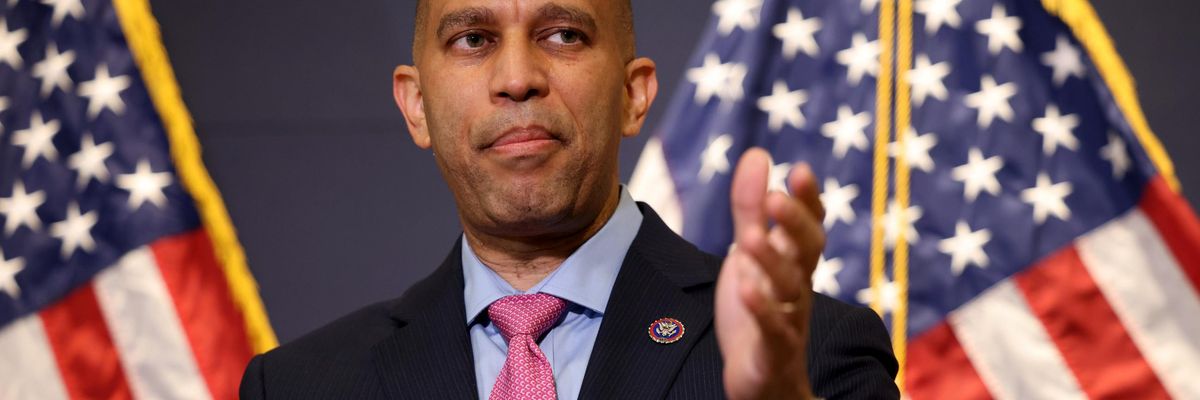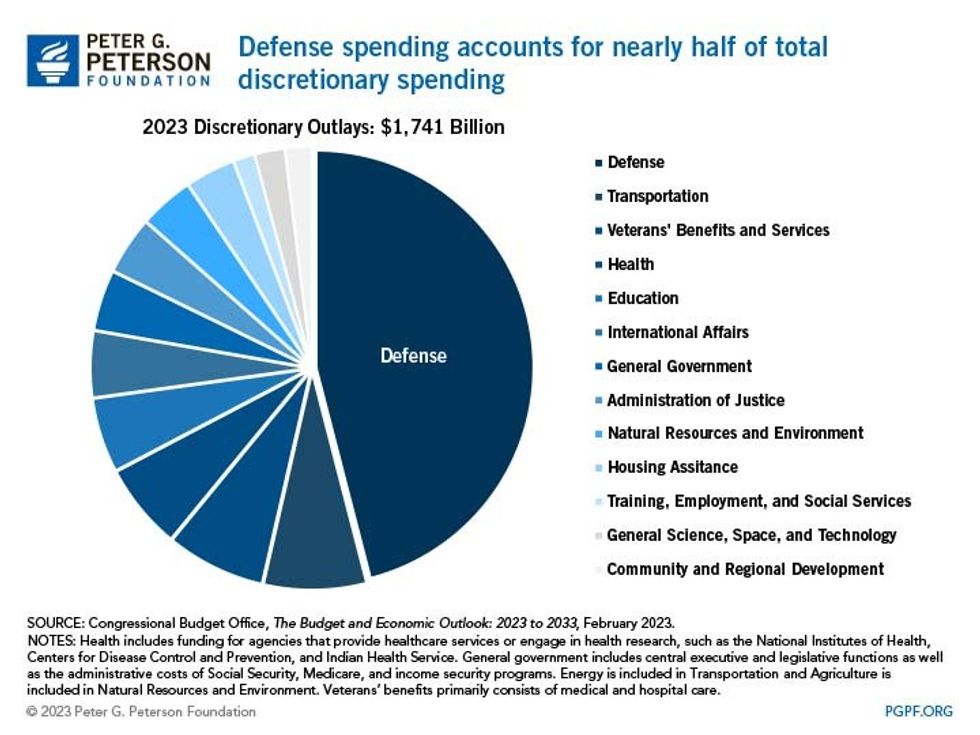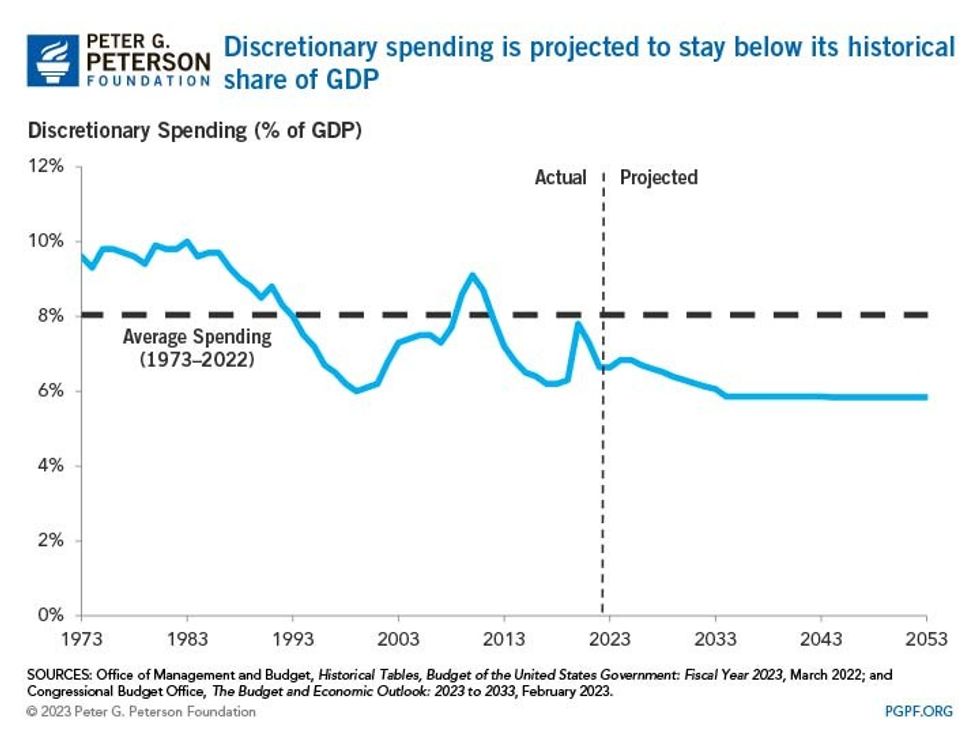For months, President Biden couldn’t have been clearer: he would not negotiate over the so-called debt ceiling, an annual financing mechanism House Republicans voted to block unless a freeze was placed on government spending.
Biden’s resolve, we were told, was rooted in experience. He was vice president the last time Republicans forced a showdown over the debt ceiling. It shook financial markets, caused the first downgrade in the U.S. government’s credit rating, and led to an agreed-upon $2.1 trillion in spending cuts. As NBC News put it,
President Barack Obama and Vice President Joe Biden sat by the fireplace in the Oval Office, with their top aides on the couch. While relieved at having narrowly averted disaster, they were stunned by what had transpired.
Obama and Biden made a vow: Never again.
Biden was unequivocal. “I will not let anyone use the full faith and credit of the United States as a bargaining chip,” he said in January.
“Happy to meet with (House Speaker Kevin) McCarthy, but not on whether or not the debt limit gets extended,” Biden said in April. “That’s not negotiable.”
On May 1, Biden again said it was “non-negotiable.”
The latest round of negotiations took place on Monday, May 22.
Both Sides, Not
The White House initially tried to save face by claiming they were negotiating over future spending,not thedebt ceiling. But it’s hard to keep making that claim when everyone, including your own administration, is (correctly) stating that the government will default if they don’t reach an agreement soon.
Before Monday’s meeting, CNBCreported, “Biden emphasized that both men needed a deal that ‘we can sell to both sides’ of a closely divided, hyper-partisan Congress.”
Democrats always cave under Republican pressure, and progressive Democrats always cave under conservative Democratic pressure.
Both sides? Hyper-partisan? That’s half right. The ultra-right wing of the far-right Republican Party seems willing to let the government default if it doesn’t get what it wants, but House Democrats have already sent a very different signal.
“We're willing to discuss freezing spending,” House Minority Leader Hakeem Jeffries (D-N.Y.) told reporters. “That's an inherently reasonable position many in our party might even be uncomfortable with, but President Biden recognizes we're in a divided government situation.”
“Many in our party”? Jeffries can’t seem to hide his contempt for his own party’s left. But then, why should he bother? He knows that, unlike the right, House progressives always tend to fall in line. As Semafor’s Joseph Zeballos-Roig writes, “If Biden does manage to strike a deal with McCarthy, it seems unlikely Congressional Democrats would really vote to reject it and throw the stability of the entire global economy into question.”
Right. They’re the responsible ones—that is, the ones who always seem to lose. It’s a monkey-house hierarchy, with the far-right on top and the left on the bottom: Democrats always cave under Republican pressure, and progressive Democrats always cave under conservative Democratic pressure. Neither the Democratic Party leadership nor its left wing have figured out how to fight these tactics, despite decades of experience—and, in this case, despite legal workarounds for the debt ceiling threat.
American Pie
Republicans are also calling for increases in the already-bloated war budget, as well as veterans’ benefits. That means all the cuts must come from the left side of the pie chart below—from line items like health care for children, international aid, education, the environment, housing, and defense.

And discretionary spending is not “out of control.” In fact, it’s down from recent decades:

The total cost of the programs Republicans want to cut is roughly $800 billion per year. All the items listed above amount to about 15 percent of the total government budget. We are still in an inflationary period, so it would require massive cuts to keep overall spending flat. And remember, they are proposing spending cuts without any tax increases on the wealthy or corporations.
The Price of Everything, the Value of Nothing
Nevertheless, Hakeem Jeffries says theirs is “an inherently reasonable position.”
Inherently reasonable? $800 billion is less than the personal wealth held by America’s eight richest billionaires. And U.S. billionaires are “almost a third richer (over a trillion dollars, in real terms) than they were at the onset of the pandemic in 2020.”
Inherently reasonable? Life expectancy continues to fall in the United States, which now ranks 46th in worldwide longevity. Americans with the shortest life expectancies “tend to have the most poverty, face the most food insecurity, and have less or no access to healthcare.”
Inherently reasonable? One in five American children lives in poverty.
Inherently reasonable? Poverty is the fourth-leading cause of death in the United States, according to a paper in the Journal of the American Medical Association.
Inherently reasonable? The child tax credit improved health for infants and mothers but was discontinued and there is no serious talk of reinstating it.
Inherently reasonable? 25.7 million people in Sudan urgently need humanitarian assistance.
I could go on, but you get the idea.
The ultra-right will stop at nothing to get what it wants. In fact, they’re still upping the ante:
Texas Rep. Chip Roy, a leader of the Freedom Caucus, said he’d be willing to consider a debt limit extension past the 2024 presidential election if the border bill — which the White House has already promised to veto — was tacked onto the final package. “Everything has a price,” he told Semafor.
Everything has a price. Everything except the lives of children, the sick, and the poor. A political party could choose to fight for these victims of perverse policy—but apparently that wouldn’t be reasonable.


